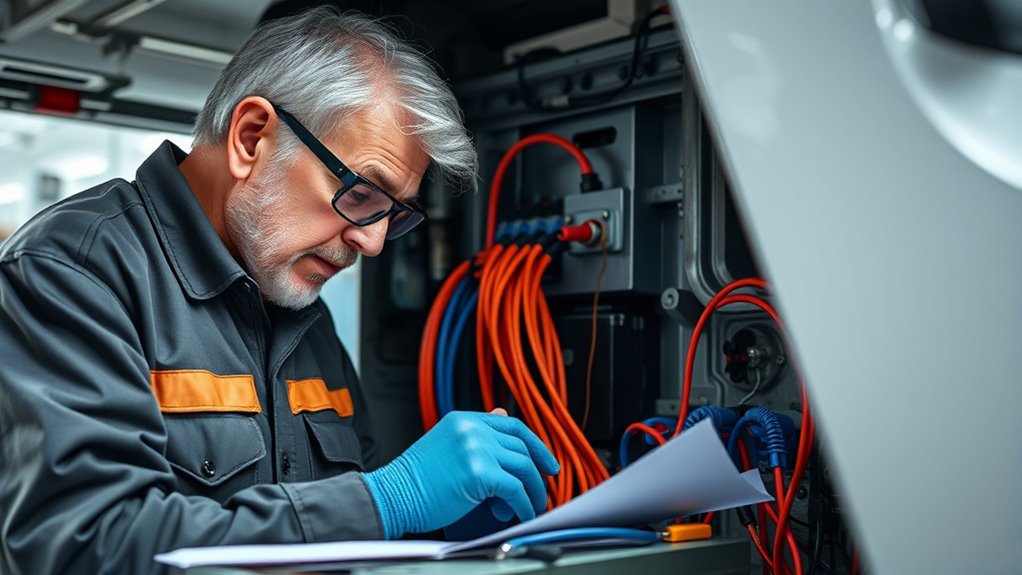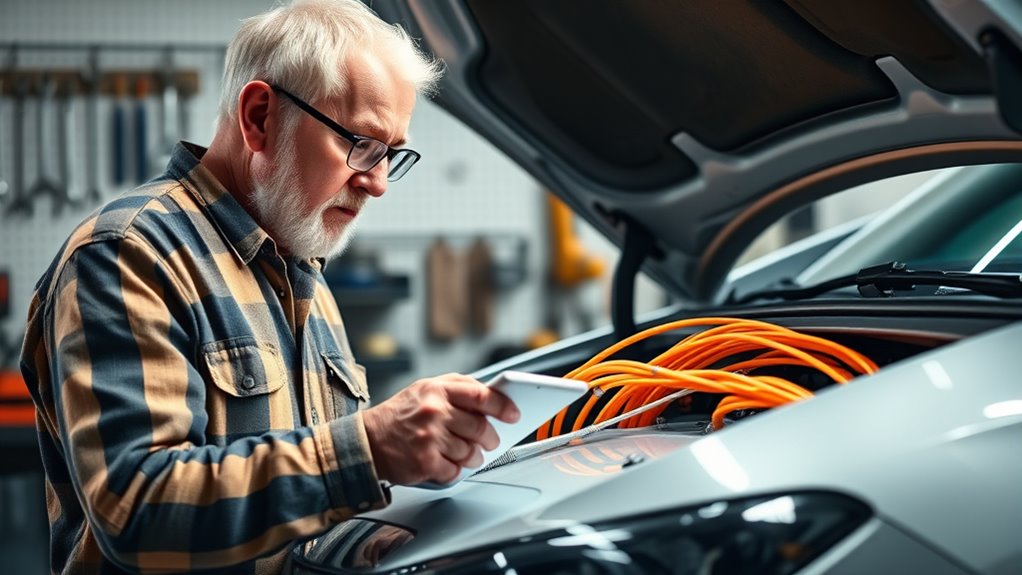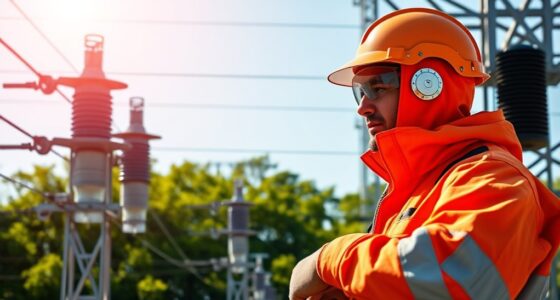As a retired diesel mechanic, you’re adapting to EV skills by learning how to handle high-voltage systems safely. This involves understanding electrical safety protocols, using specialized diagnostic tools, and recognizing risks like electrical shocks and thermal runaway. Your experience with engines gives you a strong foundation, but working with batteries and controllers requires new techniques. Continuously developing these skills guarantees you’re prepared for the evolving automotive landscape—if you keep exploring, you’ll discover more about mastering EV systems.
Key Takeaways
- Retired diesel mechanics must undergo specialized training to safely handle high-voltage EV components and systems.
- Learning diagnostic tools tailored for EVs is essential for accurate troubleshooting and repair.
- Adapting involves understanding high-voltage safety protocols, including proper de-energization and insulation techniques.
- Gaining knowledge of battery management, modules, and cooling systems enhances repair effectiveness.
- Continuous education helps retired diesel technicians stay current with evolving EV technology and safety standards.

After decades working as a diesel mechanic, John decided to learn electric vehicle (EV) skills to stay current with industry trends. Shifting from diesel engines to high-voltage systems might seem intimidating at first, but with the right approach, you can master the essentials quickly. One critical aspect you need to prioritize is understanding battery safety. EV batteries store a significant amount of energy, and mishandling them can lead to serious injuries or damage. You’ll learn to recognize the risks involved with high-voltage components and follow proper safety protocols, such as wearing insulated gloves and using caution when disconnecting or working near battery packs. Proper training guarantees you avoid electrical shocks and prevent thermal runaway incidents, which can be catastrophic.
Equipping yourself with the right diagnostic tools is equally essential. Traditional diagnostic equipment won’t suffice for high-voltage EV systems. You’ll need specialized tools designed to interface with EV battery modules, power management systems, and controllers. These diagnostic tools allow you to scan for fault codes, monitor voltage levels, and analyze system performance accurately. They help you pinpoint issues without risking exposure to dangerous voltages, making troubleshooting safer and more efficient. As you become familiar with these tools, you’ll find that diagnosing problems in EVs becomes faster and more precise, saving both time and effort.
Understanding battery safety also involves knowing how to properly handle, test, and service high-voltage components. You’ll learn to identify safe working procedures, such as de-energizing the system before performing repairs and checking for residual voltage. Handling high-voltage connectors and wiring requires careful attention, and you’ll develop a keen sense for safe practices that protect both yourself and the vehicle. This knowledge not only keeps you safe but also guarantees the longevity of the vehicle’s electrical system. Additionally, gaining knowledge about high-voltage system components helps you understand how these systems operate and how to troubleshoot them effectively.
As you gain confidence in working with EV systems, you’ll appreciate how diagnostic tools complement your safety knowledge. They provide real-time data, helping you make informed decisions during repairs. For example, if a battery pack isn’t charging correctly, diagnostic tools can help you identify whether the issue lies with the battery cells, cooling system, or power management module. This integrated approach of safety awareness and advanced diagnostics makes you a valuable technician capable of handling the complexities of modern EVs.
Ultimately, adapting to high-voltage systems requires continuous learning and careful attention to safety protocols. By mastering battery safety and investing in specialized diagnostic tools, you position yourself as a proficient technician ready for the evolving automotive landscape. It’s a challenging shift, but with focus and proper training, you’ll find that working on EVs becomes just another skilled trade you excel in.
Frequently Asked Questions
What Certifications Are Needed to Work on EVS?
To work on EVs, you need specific certifications like battery certifications and high voltage training. These certifications guarantee you’re qualified to handle the high-voltage systems safely. You should complete manufacturer-specific training and obtain industry-recognized credentials, such as ASE certification in electric vehicle systems. Staying updated on safety protocols and technical skills is vital, so always pursue ongoing education to keep your certifications current and maintain your expertise in EV maintenance.
How Does High-Voltage Safety Differ From Diesel Systems?
You need to be extra cautious with high-voltage hazards in EVs compared to diesel systems. Unlike diesel, high-voltage systems carry lethal electrical risks, so you must use proper personal protective equipment, such as insulated gloves and mats. Always disconnect the high-voltage battery before working, and follow strict safety protocols. Your focus should be on preventing electrical shock, which demands different safety measures than those used for diesel engine work.
What Tools Are Essential for EV Repair?
You’ll need specialized diagnostic tools to efficiently troubleshoot EVs, revealing hidden issues in high-voltage systems. Don’t forget a reliable multimeter and insulated gloves for safety. A battery management system tester is vital to assess battery health, while high-voltage cables and connectors are essential for repairs. These tools guarantee you can safely and accurately diagnose and fix EVs, revealing the secrets beneath the high-voltage systems.
How Long Does It Take to Retrain for EV Maintenance?
Retraining for EV maintenance typically takes a few weeks to a few months, depending on your prior experience and dedicated study time. During this period, you’ll learn about battery management systems and charging infrastructure, critical for safe and effective repair. Hands-on training helps you understand high-voltage systems, ensuring you’re prepared to handle EV-specific components confidently and efficiently in a shorter learning curve.
Are EVS More Difficult to Troubleshoot Than Diesel Engines?
You might find EV troubleshooting more challenging than diesel engines because of battery management systems and software diagnostics. EVs rely heavily on high-voltage systems and complex electronics, requiring you to interpret diagnostic codes and monitor battery health. Diesel engines, by contrast, involve mechanical parts and simpler sensors. So, while EV troubleshooting demands new skills, your mechanical background gives you a solid foundation to adapt quickly.
Conclusion
You embrace new skills, you adapt with determination, and you stay ahead of the curve. Moving from diesel to electric isn’t just about technology; it’s about mindset. You learn, you grow, you evolve. You prove that age isn’t a barrier, that experience is valuable, and that change is possible. In mastering high-voltage systems, you show that your passion for mechanics and your willingness to learn remain unchanged. Keep pushing forward, keep expanding your skills, and keep driving into the future.









